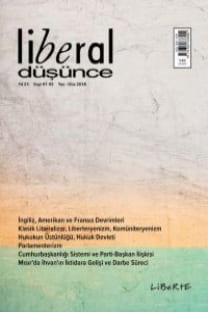Reflections on Human Action After 50 Years
The core of Ludwig von Mises’ thought is the theory of human action, or praxeology, the general science he seeks to articulate. Within this general science is included—embedded in it—catallactics, or the science of exchange (Mises [1949] 1996: 1–3; hereafter M). Consequently, to Mises everything we seek to study in economics stems ultimately from individual choice, the key to which is subjectivist economics (stemming from the 1870s revolution by Menger, Jevons, and Walras). Thus, ‘‘Choosing determines all human decisions. In making his choice man chooses not only various material things and services. All human values are offered for option. All ends and all means . . . are ranged in a single row and subjected to a decision which picks out one thing and sets aside another’’ (M, p. 3). Moreover, ‘‘Human action is necessarily always rational’’ (M, p. 19). For Mises this is a truth, not a hypothesis to be tested that can be right or wrong. This is because praxeology is neutral with regard to any value judgments concerning its data—that is, the ultimate ends chosen in human action. Hence, there is no objective basis for asserting that anyone’s choices can be irrational.
Reflections on Human Action After 50 Years
The core of Ludwig von Mises’ thought is the theory of human action, or praxeology, the general science he seeks to articulate. Within this general science is included—embedded in it—catallactics, or the science of exchange (Mises [1949] 1996: 1–3; hereafter M). Consequently, to Mises everything we seek to study in economics stems ultimately from individual choice, the key to which is subjectivist economics (stemming from the 1870s revolution by Menger, Jevons, and Walras). Thus, ‘‘Choosing determines all human decisions. In making his choice man chooses not only various material things and services. All human values are offered for option. All ends and all means . . . are ranged in a single row and subjected to a decision which picks out one thing and sets aside another’’ (M, p. 3). Moreover, ‘‘Human action is necessarily always rational’’ (M, p. 19). For Mises this is a truth, not a hypothesis to be tested that can be right or wrong. This is because praxeology is neutral with regard to any value judgments concerning its data—that is, the ultimate ends chosen in human action. Hence, there is no objective basis for asserting that anyone’s choices can be irrational.
___
- Bechara, A.; Damasio H.; Tranel D.; and Damasio, A.R. (1997) ‘‘Deciding Advantageously before Knowing the Advantageous Strategy.’’ Science 275 (28 February): 1293–94.
- Chamberlin, E. (1948) ‘‘An Experimental Imperfect Market.’’ Journal of Political Economy 61 (April) 95–108.
- Damasio, A. (1994) Descartes’ Error. New York: Avon Books.
- Davis, D.D., and Holt, C.A. (1993) Experimental Economics. Princeton N.J.: Princeton Uni- versity Press.
- Fehr, E.; Gachter, S.; and Kirchsteiger, G. (1996) ‘‘Reciprocity as a Contract Enforcement Device: Experimental Evidence.’’ Econometrica 65: 833–60.
- Gazzaniga, M. (1998) The Mind’s Past. Berkeley: University of California Press.
- Gould, S.J., and Lewontin, R. (1979) ‘‘The Spandrels of San Marco and the Panglossian Paradigm: A Critique of the Adaptionist Programme.’’ Proceedings of the Royal Society B205: 581–98.
- Gould, S.J., and Vrba, E. (1981) ‘‘Exaptation: A Missing Term in the Science of Form.’’ Pa- leobiology 2: 4–15.
- Gunnthorsdottir, A.; McCabe, K.A.; and Smith, V.L. (1999) ‘‘Using the Machiavellian Ins- trument to Predict Trustworthiness in a Bargaining Game.’’ Economic Science Labo- ratory, University of Arizona.
- Hayek, F.A. (1988) The Fatal Conceit. Chicago: University of Chicago Press.
- Kagel, J.H., and Roth, A.E. (1995) The Handbook of Experimental Economics. Princeton, N.J.: Princeton University Press.
- McCabe, K.A.; Rassenti, S.J.; and Smith, V.L. (1996) ‘‘Game Theory and Reciprocity in Some Extensive Form Experimental Games.’’ Proceedings National Academy of Science 93: 1996, 13421–28.
- McCabe, K.A., and Smith, V.L. (1999) ‘‘A Comparison of Naive and Sophisticated Subject Behavior with Game Theoretic Predictions.’’ Economic Science Laboratory, University of Arizona. (To appear in Proceedings National Academy of Science.)
- Mises, L. von ([1949] 1996) Human Action: A Treatise on Economics. 4th revised ed. San Francisco: Fox and Wilkes.
- North, D. (1991) Institutions, Institutional Change, and Economic Performance. New York: Cambridge University Press.
- Pinker, S. (1994) The Language Instinct. New York: William Morrow.
- Smith, A. ([1776] 1909) The Wealth of Nations. New York: P.F. Collier.
- Smith, V.L. (1991) Papers in Experimental Economics. New York: Cambridge University Press.
- Smith, V.L. (1998) ‘‘The Two Faces of Adam Smith.’’ Southern Economic Journal 65 (July): 1–19.
- Tooby, J., and Cosmides, L. (1992) ‘‘The Psychological Foundations of Culture.’ In J. Bar- kow, L. Cosmides, and J. Tooby (eds.) The Adapted Mind: Evolutionary Psychology and the Generation of Culture, 19–136. Oxford: Oxford University Press.
- Tremblay, L., and Schultz, W. (1999) ‘‘Relative Reward Preference in Primate Obitofrontal Cortex.’’ Nature 398 (22 April ): 704–8.
- Zeaman, D.J. (1949) ‘‘Response Latency as a Function of the Amount of Reinforcement.’’ Experimental Psychology 39: 466–83.
- ISSN: 1300-8781
- Başlangıç: 1996
- Yayıncı: Liberte Yayınları
Sayıdaki Diğer Makaleler
Mises ve Onun Kapitalist Sistem Anlayışı
Did Hayek and Robbins Deepen the Great Depression?
Japon Kılıçları’nın Yapım Sürecinde Bilginin Rolü ve Piyasası Üzerine
William H. Hutt: “Klâsik” Avusturyalı
Friedman, Hayek’e Meydan Okuyor
Avusturya İktisadı: Bir Entellektüel Seyahatin Şahikası
Avusturyacı Konjonktür Teorisi ve Küresel Kriz
Rekabetçi Bir Süreç Olarak Hukuk
